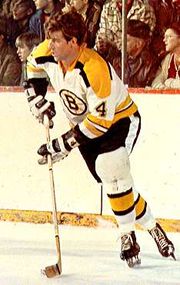Lessons Learned From Bobby Orr
Growing up in the 1960s in Canada meant hockey was not only your pastime, but in fact, a national duty. Living in Montreal implied the Canadiens were your team. Not so fast! There was one player, Number 4 from the archrival Boston Bruins, who was my hero.
A Canadian from Parry Sound, about two-and-a-half hours due north of Toronto, Bobby Orr was the best defenseman ever to play the game (and if you don’t agree, I would be pleased to debate this topic anytime). He played eight years of pro hockey, and in that time span he quite literally controlled the game every time he stepped on the ice. The number of records he created is a testament to his domination.
Remember those were the days of no helmets, less padding and perhaps a bit more skating. The “neutral zone” defensive trap and all the other shenanigans that take place today had not yet been invented. There seemed to be a certain finesse to the sport, and while some (particularly my friends in Montreal) considered Orr a “puck hog,” his brilliance on skates in unquestioned.
But what does Bobby Orr have to do with hospitality?
Bobby Orr’s recently released autobiography, “Orr, My Story,” makes for a fantastic read. It is a fascinating tale of an individual whose life lessons apply to any career in hospitality. Here are four lessons I gleaned:
1. Have passion for what you do.
Orr never thought of hockey as a job. Rather, he felt honored to play, and he looked forward to every day. Each game was an opportunity to hone his skills, to learn and to grow. His stats prove it! Passion is a critical driver to success. If you don’t have passion for hospitality, perhaps this is not the right field for you. Passion drives service excellence and makes hotel management fun.
2. Just because you’re in one position doesn’t mean you can’t lead.
Orr played defense. Classically, that position consigns you to protect the goalie and pass the puck up to a winger or center. Orr smashed that rule. His skills allowed him to not only play as a defenseman, but also take the puck well into the offensive zone. Now think of your own position. How can you demonstrate leadership? And, if you are the GM, how can you encourage your own team members to step forward?
3. Know when to quit.
No one told Orr to leave pro hockey. But when he felt he could no longer sustain peak performance, he retired from the game at the ripe age of 30. Perhaps, for some, it is time to look at coaching, rather than being the lead or line manager.
4. Be charitable.
Orr never stopped giving back to the community, but he never talked much about it, serving in a quiet way. All of this occurred despite terrible financial struggles that saw most of his playing income lost to fraud. What are you doing to help others less fortunate than you?
If you’re a hockey fan, you might have taken more than a fleeting glance at the book on the shelves or even read it already. If you take your kids to the rink in the early morning every weekend, as I did for half a dozen years, buy it for your kids as well. And, if you’re a hotelier just looking for inspiration, this book might also score you a hat trick.
(Article published by Larry Mogelonsky in HOTELSmag on October 18, 2013)




